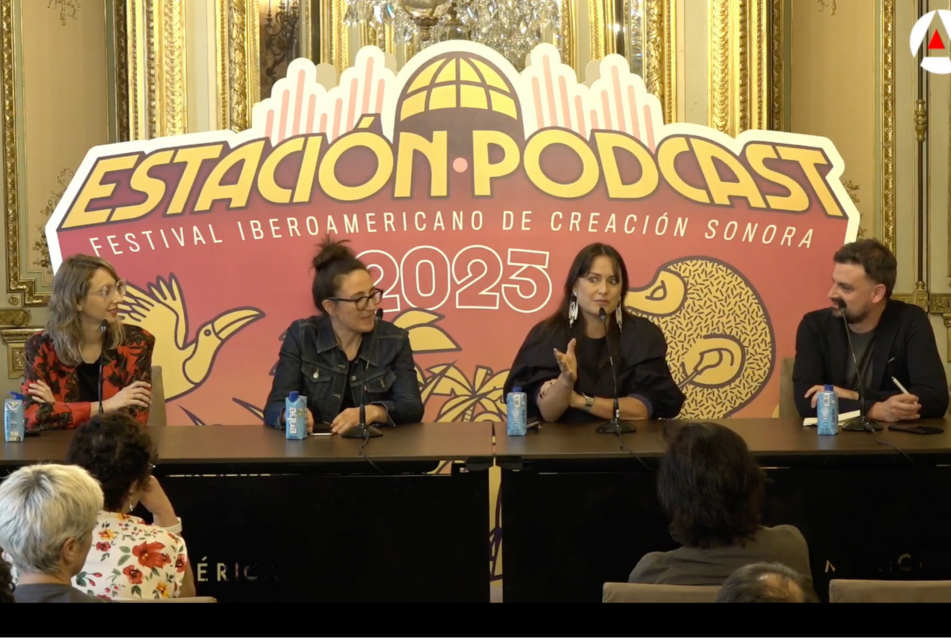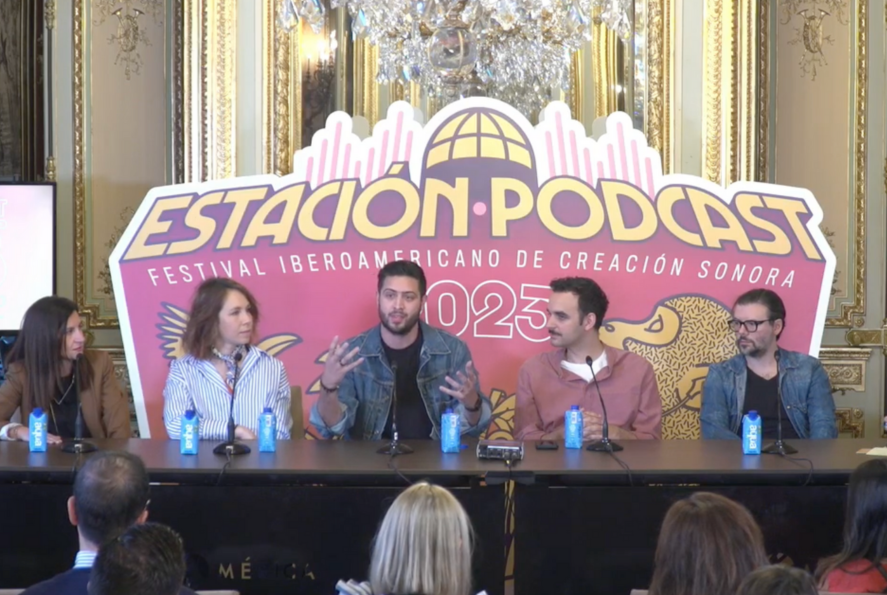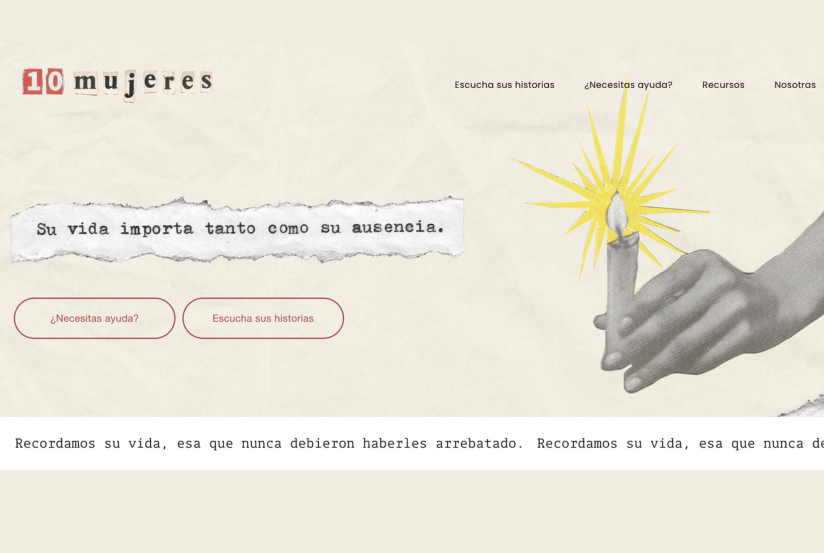Podcast creators from Latin America shared their experiences and points of view on podcast creation and forms of financing during several panels at the second edition of the Estación Podcast Ibero-American Sound Creation Festival, held in Madrid, Spain, from May 9 to 13.
One of the most discussed topics by producers of journalistic, conversational and narrative non-fiction podcasts from countries such as Mexico, Argentina and Colombia was the different business model options and the different ways that creators have experimented in their attempt to make their productions sustainable.
For Argentine journalist Daniel Wizenberg, the precarious context that affects journalism almost everywhere in the world has also reached the audio industry, even in the United States, where recently the New York-based Canadian digital media group Vice announced the closure of several of its productions and verticals, including audio, two weeks before declaring total bankruptcy.
"We should no longer think about business models. Journalism is not a business. I’ve seen that when it’s a business, it ceases to be journalism," Wizenberg said at the panel "Financing investigative sound journalism." "The most urgent task is to be able to finance the work of journalists. We are not asking for a lot, we are asking to get paid well to do our work well."

From left to right: Flavia Campeis (Argentina), Ana Tudela (Spain), Carolina Guerrero (Colombia) and Daniel Wizenberg (Argentina) spoke about ways to finance investigative audio journalism. (Photo: Screenshot from YouTube)
Wizenberg, who is currently audience engagement & impact manager at Journalismfund Europe, a Brussels-based nonprofit organization dedicated to stimulating cross-border investigative journalism, mentioned grants and fellowships as among the most viable options for funding podcast projects.
He said Journalismfund Europe seeks to encourage the production of more investigative journalism in audio format. Few such proposals are submitted for funding from the organization.
Since there are few funding choices specifically for podcasts, aspiring creators should be prepared to sell their projects in different formats and adapt them to the conditions of existing funds, Wizenberg said.
"Almost no grant asks for exclusivity, so the same story, if you find different angles, can be funded several times. And that's where you really work much more comfortably. With the first one, you cover costs, and with the second one you start to work a little more comfortably," he said.
One of the podcast production publishers that is financed through funding from organizations is Radio Ambulante, the New York-based organization that has a network of journalists in several Latin American countries. Its CEO, Carolina Guerrero, was part of the panel discussion and said that at least a third of Radio Ambulante's revenue comes from foundations.
Guerrero said that seeking support from organizations is a full-time job and is usually initially secured for specific projects. However, the mission of podcast creators must be to earn the trust of organizations and build a relationship that will fund the operations of the entire organization.
"When you build a relationship with foundations, it’s possible to obtain this type of support, which they call 'general capacity' in the United States, which is for operations," she said. "Since they trust you, you can obtain support for several years and with fixed amounts.”
Another third part of Radio Ambulante's income, Guerrero said, comes from distribution, co-production and licensing contracts. Such is the case with the one they have with the U.S. National Public Radio (NPR), which pays them an annual amount to distribute their podcasts exclusively.
The remaining third of their budget comes from their membership program "Deambulantes" and side projects such as Lupa, a Spanish language learning app based on Radio Ambulante's audio content.
"We as a non-profit organization quickly realized that producing these podcasts is super expensive. Investigation takes a long time, it can easily take two years to pursue a story [...] and the editing part is very artisanal," Guerrero said. "So what we did is that we have been building over the years a business model that does not depend solely on one source of income."
Other production companies have chosen to fund their projects through workshops and courses. Such is the case of Late Magazine, a global, independent, non-profit journalism network with representatives in several Latin American countries.
Late offers courses with expert instructors in sound journalism. Tuition revenue is used to pay instructors and the remainder is invested in the production of journalism projects, including podcasts, said Wizenberg, who is a co-founder of the organization.
One of the podcasts produced under this model was "¿Dónde Está Paula? [Where is Paula?]," a true crime podcast about the disappearance of a pregnant woman from San Lorenzo, Argentina. Its producer and narrator, Flavia Campeis, who was also part of the panel discussion, is in charge of Late's podcast workshops.
"You might say 'it's financing a job through another job,' but everything involved in the possibility of giving that workshop, which in the first year was taught by Jorge Carrión [a Spanish podcast creator], among a lot of Spanish-speaking podcast well-known names, also allowed '¿Dónde Está Paula?' to be known in other places and that other funds could arrive or that we could know where to apply [for funds] with a project of these characteristics," Campeis said.
The Argentine journalist, who presented a live adaptation of her podcast at the festival, announced that a second edition of the podcast workshop will be held between July and September of this year. This time it will be in partnership with Le Monde Diplomatique Cono Sur Edition and the Argentine digital radio station Futurock, in order to finance a second season of "¿Dónde Está Paula?"
The real gain of a podcast is not the monetary income, but rather the possibility of building a loyal and committed audience who can relate to the content of the podcast and find it useful.
This was one of the conclusions of the panel discussion "Business models and content development" of the Estación Podcast festival, which was moderated by Toni Garrido, CEO of the audio entertainment platform Sonora, from Spain.
Diego Barrazas, founder and CEO of "Dementes," a conversational podcast from Mexico which interviews figures from different fields, and who was part of the panel, said that before trying to find a formula to make money with a podcast, creators must first define why they want to create that podcast and from that seek to attract the right audience.

Diego Barrazas (center) and Olallo Rubio (right) spoke about their experience as podcast creators in Mexico during the roundtable discussion "Business models and content development". (Photo: Screenshot from YouTube)
Once you have access to an audience, he said, there are multiple external ways to generate income, such as organizing events or giving courses.
"I think what you have to focus on when you're doing a podcast is not just 'how can I make money from the podcast,' but learning all the tools that are out there that we can generate a lot of revenue with," he said. “If I sell insurance, then I do my podcast about health insurances and I have a specific audience that's looking for that. And, done, I never made a peso selling a programatic ad, but I did it through [brands] mentions or with clients coming to do business with me.”
Although the main digital audio distribution platforms such as Spotify and Apple Music offer alternatives for podcast creators to monetize their content, ranging from subscriptions and donations to advertising, these do not work without a solid community of listeners, according to Barrazas.
Podcast producers must be patient and be aware that the road to community building, and therefore monetization, takes time, he added.
"I’d recommend to get it into your head that in the first two years no money is going to come in through advertising. [...] But you can start creating a very loyal audience that needs you regardless of your size," Barrazas said. “Fifty people listening to you every month is like a classroom with 50 people who are willing to listen to you, and you can monetize that in a lot of other ways as you reach the size to be able to really leverage it on larger platforms.”
Creators must also clearly define the audience they want to reach in order to focus their efforts on that audience and develop a business model related to it, he said. Even if the number of listeners is not very large, if the podcast is designed to meet a need in that niche, the chances of monetization increase.
"I don't need to have a podcast that has a million views from 16-year-old kids if what I sell or what I want to give is to 35-year-old adults who can take out a mortgage loan," he said. "Then you have to define what game you want to play and be clear about it, and say 'how many people do I really need' or 'what kind of people do I need to have listen to this for it to make economic sense.'"
One example of the value of a loyal audience in the audio content industry is Convoy Network, the independent Spanish-language podcast platform founded by Mexican radio host Olallo Rubio, who was also present at the panel discussion.
Rubio said that he came to podcasting with a head start, since when he produced his first podcast, "El Podcast de Olallo Rubio," in 2005, he was able to capitalize on the audience he had built up since the 1990s as a commercial radio broadcaster in Mexico. Backed by that community of listeners, he secured sponsors that allowed him to move forward with his project at a time when there was no podcast industry.
That same audience allowed Rubio to launch Convoy Network in 2016. It currently has more than 120 titles of original content and is financed through a monthly subscription program with automatic renewal, in the style of video streaming platforms.
"That's the business model we've had since March 2016 to the present day. Fortunately it has turned out, not extremely successful, but functional," Rubio said. "It's been complicated to convince people to pay for something that historically has been free. Radio has always been free, or so the listener believes. In reality they are paying a price, the audience ends up being the product that the media ends up selling to sponsors."
One of the main assets that podcast creators must protect is the intellectual property of their productions, since this could lead to new sources of income that could mean the survival of the project.
Intellectual property becomes an especially relevant issue when creators reach agreements with distribution platforms, according to Paulina Herrera, co-founder and CEO of Mexico-based podcast production house Dudas Media. Herrera was part of another panel discussion, titled "The Consolidation of Podcast Production."

Dudas Media, from Mexico, launched this year its first narrative non-fiction podcast, "10 Mujeres", about victims of femicide, said co-founder Paulina Herrera. (Photo: Screenshot of diezmujeres.com)
"One hundred percent, for me, intellectual property is at the core of our business. That is the core of the business model we have today because it allows us to diversify to other products, it allows us to make adaptations, it allows us to jump to television," she said.
"Se Regalan Dudas [Doubts are given away]," the conversational podcast that has become Dudas Media's flagship production, was distributed exclusively on Spotify for two seasons. And while the production company has established this and other distribution and exclusivity agreements with audio platforms, Herrera was clear that they have never agreed to cede the intellectual property of any of the five podcasts they currently produce.
"We have found a way to collaborate and work with them [the platforms] in some other ways as well. We've done other kinds of deals," she said. "That gave us a ton of knowledge, we saw how it worked as well, but so far we've been privileged to be able to reinvest a lot of what we gain in profits into new projects."
Taking care of the intellectual property of a podcast implies getting involved in contract issues that are often outside the area of expertise of journalists and creators. For this reason, Herrera recommended getting legal advice when receiving offers from larger companies to buy, license or commission podcasts.
"It's always important to have a legal team to advise you and give you a vision of the implications this has in the long term," she said. “And it's not just any lawyer, it's intellectual property lawyers and entertainment lawyers who are very specialized in that.”
Herrera said that the negotiation for the production of Dudas Media's first narrative non-fiction podcast, "10 Mujeres [10 women]", which was launched this year and tells the story of 10 women who were victims of femicide in Mexico, took two years. The project also includes legal and psychological support, as well as a platform with information resources that seeks to answer questions about this type of crime.